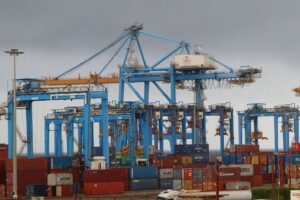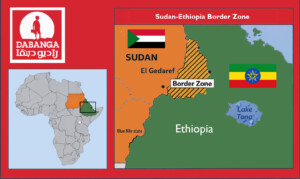UNITAMS head warns that conflict and gender-based violence threaten Sudan’s stability
Despite Sudan’s progress towards peaceful transition, the ongoing intercommunal conflict, “unanswered” violence against women, and delays in establishing key representative bodies threaten Sudan’s stability and its civilian population, Volker Perthes, Head of the United Nations Integrated Transition Assistance Mission in Sudan (UNITAMS), told the UN Security Council during a videoconference last week.
 Rally of the No Oppression Against Women Initiative celebrating the 16 Days of Activism Against Gender-Based Violence, December 2019 (RD)
Rally of the No Oppression Against Women Initiative celebrating the 16 Days of Activism Against Gender-Based Violence, December 2019 (RD)
Despite Sudan's progress towards peaceful transition, the ongoing intercommunal conflict, “unanswered” violence against women, and delays in establishing key representative bodies threaten Sudan’s stability and its civilian population, Volker Perthes, Head of the United Nations Integrated Transition Assistance Mission in Sudan (UNITAMS), told the UN Security Council during a videoconference last week.

In a press statement published by OCHA, the United Nations Office for the Coordination of Humanitarian Affairs, last week, Perthes warned of the consequences of the fact that several critical aspects of the Juba Peace Agreement remain unimplemented, most importantly the formation of a representative Legislative Council comprised of at least 40 per cent women but also the establishment of ceasefire and security committees.
He stressed that the delays in establishing a joint protection force, along with the absence of integrated security forces, “directly affect stability and the protection of civilians in Sudan”.
As an example, he mentioned the recent clashes in West Darfur that left at least 144 dead and an estimated 65,000 newly displaced. Perthes said that the government responded with the new measures to enhance security, including the establishment and deployment of joint security forces and operationalising ceasefire committees, but that such deployments have not yet started.
Perthes stressed that similar incidents of violence may occur if the authorities fail to rapidly establish the joint forces and implement Sudan’s National Plan for Civilian Protection.
He stressed that UNITAMS is ready to assist with the implementation of security-sector reforms.
Gender-based violence
Perthes further stressed that UNITAMS will continue to support women’s rights groups and Sudanese authorities to “create an enabling environment” for women and girls “to live free of fear and to exercise their full rights”.
The UNITAMS head explained that the mission has deployed three teams to Darfur to support the Sudanese police in community policing and addressing gender-based violence (GBV). He expressed his concerns over the continued reports of human rights violations against women and girls.
"such crimes should be as unacceptable now as they were during the revolution"
He said that he “agreed with women’s rights activists that such crimes should be as unacceptable now as they were during the revolution”.
Last week, Radio Dabanga published a feature article on residents of Zamzam camp for the displaced who work to overcome sexual violence stigma and support victims of GBV in North Darfur.
Many GBV victims suffer from severe injuries, such as fistulas*, and live with chronic incontinence and pain, along with an increased risk of unwanted pregnancy and sexually transmitted infections, including HIV/AIDs. They must also live with the psychological trauma and stigma of rape.
Sexual violence remains a prevalent issue throughout the country, highlighted continuously by women’s rights organisations such as the Sudanese Women’s Revolution Initiative. The Thomson Reuters Foundation ranks Sudan as one of the worst countries worldwide for women’s rights.
Radio Dabanga has previously reported on the use of systematic rape as a weapon of war and political repression in Sudan, including the mass rape of women and girls by government forces on 31 October, 2014 in Tabit, North Darfur.
"sexual violence could be easily stopped if there were political will from the government"
“The violence in general and sexual violence could be easily stopped if there were political will from the government,” according to Gaffar Mohamed Saneen, cochair of the Team Zamzam project, however, “they are very much preoccupied with issues of factional rivalry conflict.”

Perthes stressed the Sudanese government’s commitment to implementing its human rights framework, pointing out that it recently ratified the Convention on the Elimination of All Forms of Discrimination against Women (CEDAW), albeit with reservations, and approved the Protocol to the African Charter on Human and Peoples’ Rights on the Rights of Women in Africa.
Last week, the Sudanese government and the United Nations Population Fund publishes a new Standard Operating Procedures (SOPs) manual for the prevention of and response to GBV in Sudan.
In a statement on the new SOPs manual, OCHA explained that GBV issues “represent an essential component of the Sudanese society’s realities”, in addition to the conflict that affects family and community stability and exacerbates the suffering of women, girls, and children.
Peace negotiations
Perthes also explained that the mission aims to support and facilitate the peace negotiations between Abdelaziz El Hilu’s Sudan People’s Liberation Army-North (SPLM-N) and the Sudanese government. He stressed that UNITAMS works to ensure the meaningful participation of women in the peace talks.
In March, a number of women’s organisations announced their support for the negotiating position of the SPLM-N, which advocates secularism and the separation of religion and state.
Perthes also mentioned the strengthening of Sudan’s relationship with the International Criminal Court (ICC) in The Hague, Netherlands, and thanked France for hosting the recent support conference in Paris to help ease Sudan’s debt burden.
*What is a fistula?
A fistula is an abnormal connection or passageway between two organs or body cavities that do not usually connect. A urinary fistula is an abnormal passage between the bladder and the vagina and between the rectum and the vagina. In most countries in Africa, the most common cause of fistulas is childbirth or sexual violence, most conspicuously in the form of rape, gang rape, and the insertion of sharp objects into the vagina or rectum.











 and then
and then